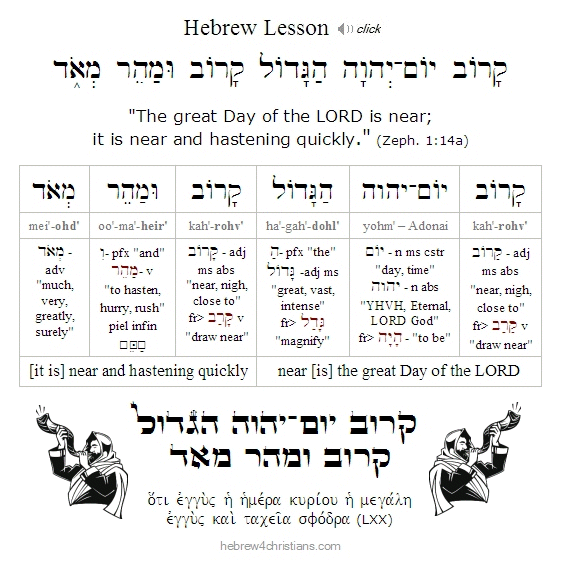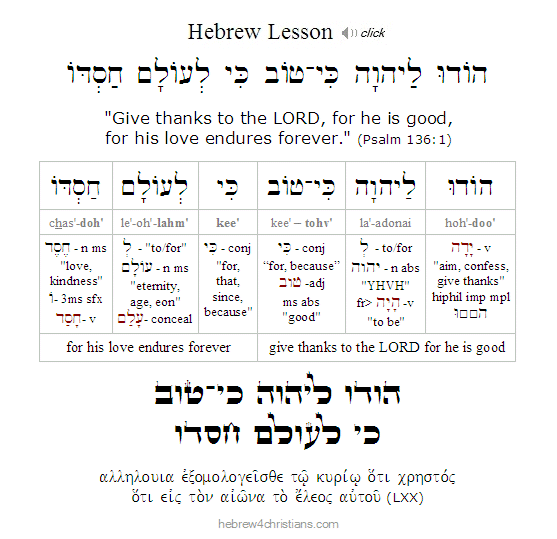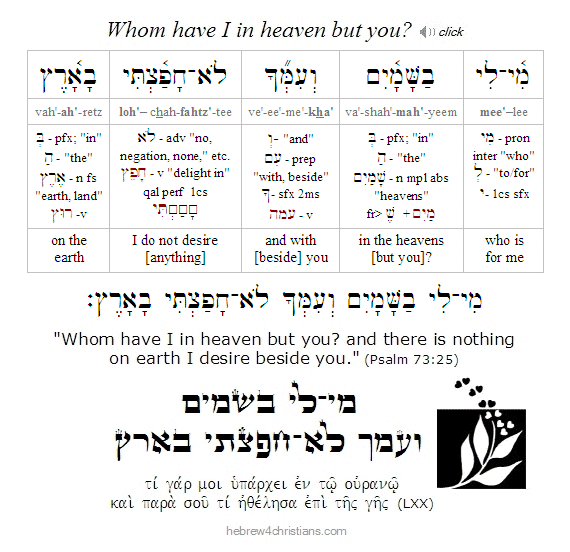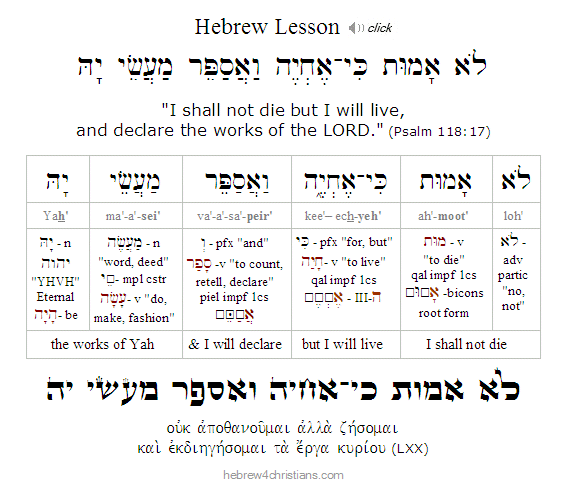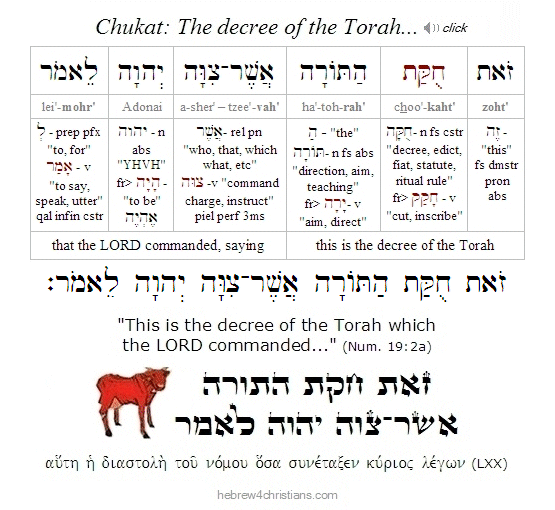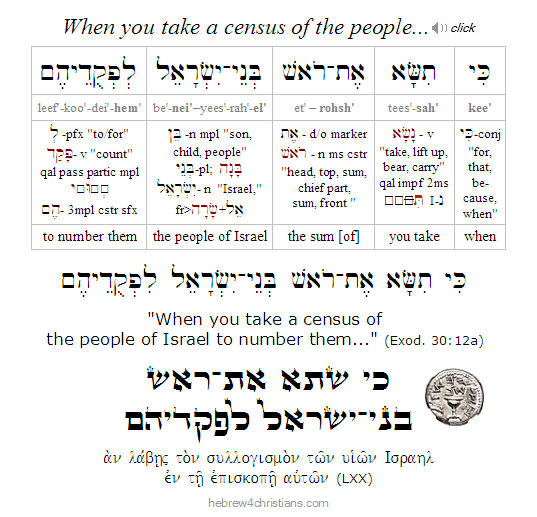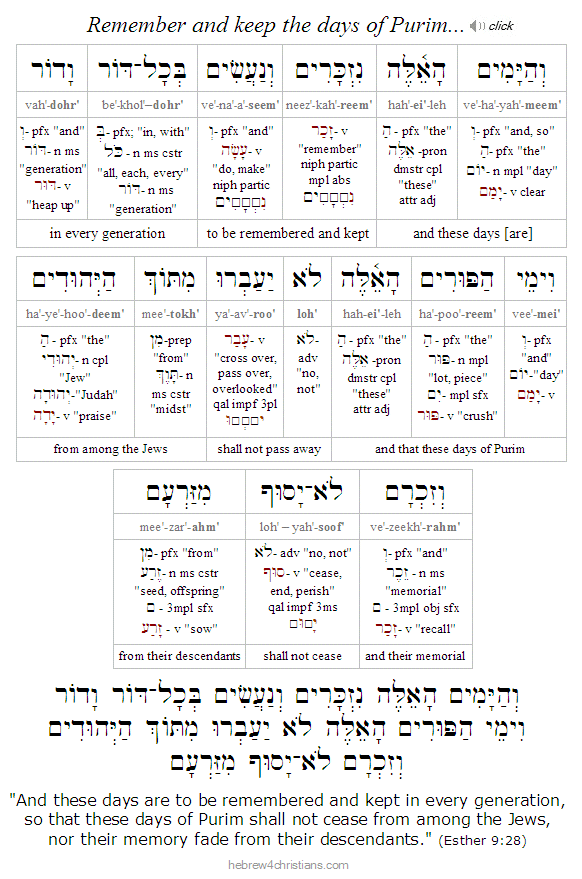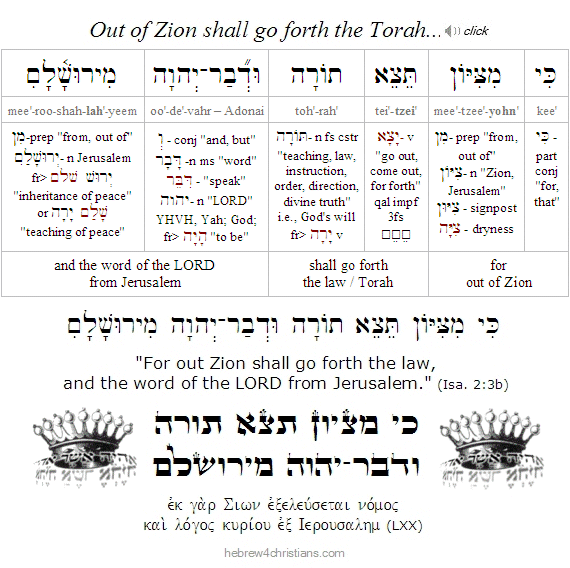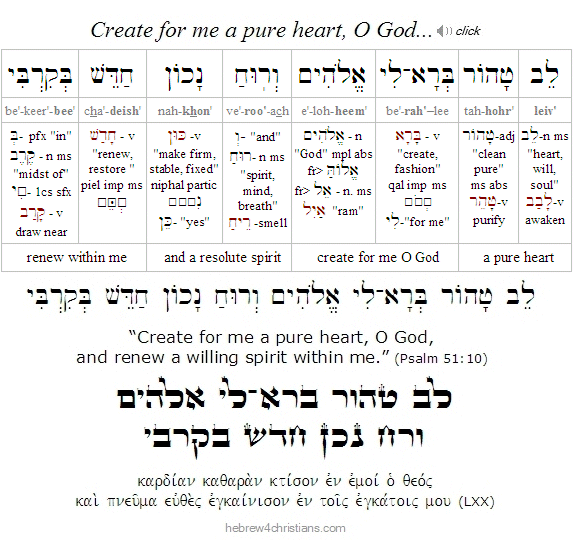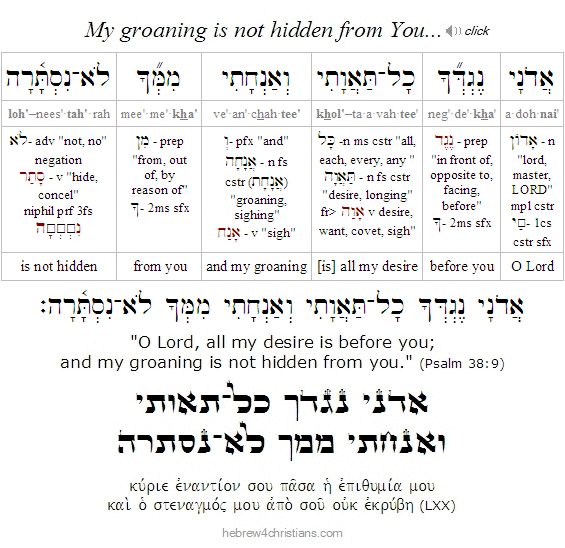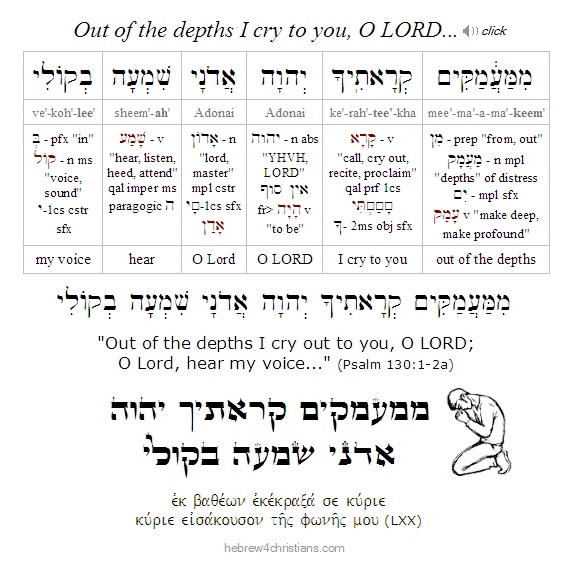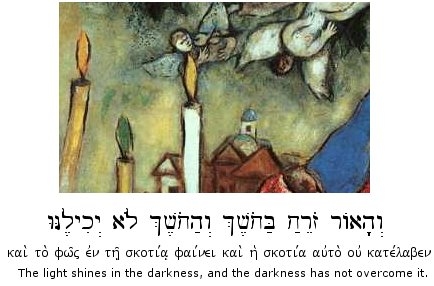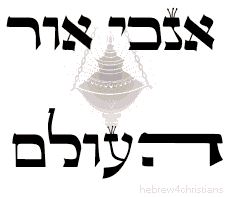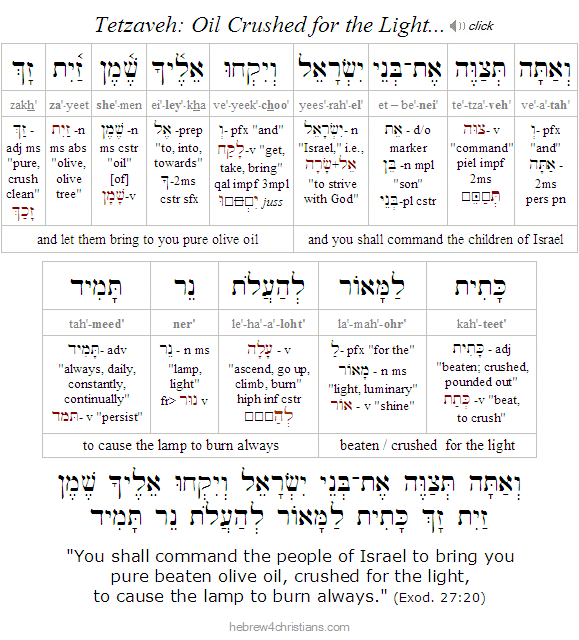|
March 2023 Updates (continued)
Note: If any page content appears to be missing, please refresh the page...
Purim and Prophecy...
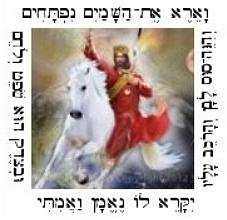
[ The holiday of Purim occurs this evening at sundown this year... ]
03.07.23 (Adar 15, 5783) Both Chanukah and Purim are holidays that celebrate God's victory over the forces of darkness... Just as the prophet Daniel foresaw the events of Chanukah, that is, the rise of "Epihpanes," the "Messiah of Evil" who will one day attempt to "assimilate" all of humanity into a "New World Order" (Dan. 9:27, 2 Thess. 2:3; Rev. 13:7-9, etc.), so Purim foretells how this wicked one will attempt to destroy the Jewish people during the End of Days (אַחֲרִית הַיָּמִים), though he will be destroyed by his own wicked devices. The Midrash Esther says that Purim, unlike many of the other holidays, will be celebrated even after the final redemption after the End of Days. This is because the story of Purim -- i.e., God's covenantal faithfulness and defense of His people -- will be magnified in the deliverance that leads to the establishment of the Messianic Kingdom upon the earth. Indeed, the Second Coming of the Messiah will be regarded as the final fulfillment of Purim! So while it is a often seen as time of unbridled celebration in Israel (ad lo yoda), the holiday of Purim has a very sober prophetic message that foretells the glorious end of this age.
Here is a vision of the coming "Purim haGadol," the great deliverance to come:
"Then I saw heaven opened, and behold, a white horse! The one sitting on it is called Faithful and True (נֶאֱמָן וְיָשָׁר), and in righteousness he judges and makes war. His eyes are like a flame of fire, and on his head are many diadems, and he has a Name written that no one knows but himself. He is clothed in a robe dipped in blood, and the Name by which he is called is the Word of God (דְּבַר הָאֱלהִים). And the armies of heaven, arrayed in fine linen, white and pure, were following him on white horses. From His mouth comes a sharp sword with which to strike down the nations, and He will rule them with a rod of iron. And He will tread the winepress of the fierce fury of the wrath of God, the Ruler over All (παντοκράτωρ), the LORD God Almighty (יְהוָה אֱלהֵי צְבָאוֹת). On his robe and on his thigh he has a Name written, the King of kings (מֶלֶךְ הַמְּלָכִים) and the Lord of lords (אֲדנֵי הָאֲדנִים). And with the breath of his lips He will slay the wicked" (Rev. 19:11-16).
May that day come speedily, and in our time... Amen.
Hebrew Lesson
Zeph. 1:41a reading (click):
HAPPY PURIM CHAVERIM!
During this Purim 5783, let's remember God's providential hand in our lives, how He works all things together for the good of his people, and that like wicked Haman, the enemy of our souls will likewise meet his fate, and then finally all shall all our mourning be turned into dancing! Amen. Purim Sameach, chaverim!
Finding Real Treasure...
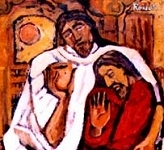
03.06.23 (Adar 13, 5783) Yeshua teaches us to earnestly seek for what really matters in life, to discover that which is best of all. He said, "The kingdom of heaven is like treasure hidden in a field, which a man found and covered up. Then in his joy he goes and sells all that he has and buys that field. Again, the kingdom of heaven is like a merchant in search of fine pearls, who, on finding one pearl of great value, went and sold all that he had and bought it" (Matt. 13:44-46). Here Yeshua illustrates that a relationship with God is the true source of joy and value in life, and that all other passions and desires are like "fools gold" when compared with its overwhelming worth...
In this connection Soren Kierkegaard wrote: "If anyone thinks he is a Christian and yet is indifferent toward being that, then he really is not one at all. Indeed, what would we think of a person who gave assurances that he was in love and also that it was a matter of indifference to him?" (Works of Love). The Shema, the "first and greatest commandment," is to love God "bekhol levavkha" (בְּכָל־לְבָבְךָ) with all our hearts, and yet how is that love possible apart from the revelation of the passion of love itself? "We love because God first loves us" (1 John 4:19), and therefore teshuvah ("repentance") is a matter of being in love, celebrating God's heart for us, awakening to its wonder, and being thrilled and overjoyed at its reality. Isn't this the essence of the matter?
"Shimon ben Yonah, atah ohev oti?" – "Simon son of Jonah, do you love me?" (John 21:17). But how can we love the Lord apart from trusting his heart for us? "Come unto Me," Yeshua says, "live in Me and I will live in you" (John 15:1-5; Matt. 11:28-30). O Lord God our Savior, deliver us from apathy and indifference! Soften our hearts and awaken us to our great desire and need for you! Hashivenu, Adonai: turn us, O LORD, and we shall be turned; heal us, and we shall be healed... Help us to come to you and to know the breadth and length and height and depth of your great love for us (Eph. 3:18-19).
So for what do you hope, friend? What are your dreams? Your deepest desires? Where is your treasure? Yeshua cautioned those who sought their happiness in this world: "Do not store up for yourselves treasures on earth... be rich toward God" (Matt. 6:19-20; Luke 12:21). When we treasure God, our focus is directed toward the eternal reality, and our interest in this world is minimal. We trust God to meet our daily needs and surrender our future to His care. The only worry we face concerns our own deficiencies in our obligations to the Savior. Our duty is to love God in the truth - bekhol levavkha - with all our heart, having no thought of ourselves. Indeed, as I have mentioned before, self-denial means to quit thinking about yourself (from α-, "not," + ῥέω, "to speak") by focusing on God's love for you. As Simone Weil once said, "It is not my business to think about myself. My business is to think about God. It is for God to think about me." Amen; we are healed in His love for us.
מי־לי בשׁמים
ועמך לא־חפצתי בארץ
mee'-lee · va·shah·mah'·yeem
ve·ee·me·kha · loh-chah·fahtz'·tee · va·ah'·retz

"Whom have I in heaven but you?
And there is nothing on earth that I desire besides you."
(Psalm 73:25)

Hebrew Lesson
Psalm 73:25 Hebrew (click):
Deliverance from Death...

03.06.23 (Adar 13, 5783) The ancient Greek philosophers sought for "salvation" (Σωτηρία), which they generally understood as freedom from the fear of death... For instance Socrates sought to dispel mythical superstition by regarding philosophy as the "practice for death," by which he meant that reflecting upon this "shadowy world" would instill a profound hunger for the eternal (and ideal) world, and he therefore advised that, since we all must die, we ought to prepare ourselves now for eternity, by focusing the mind on what is most essential, real, and beautiful. The Jewish sages likewise later affirmed, "This world is like a corridor before the World to Come; prepare yourself in the corridor, that you may enter into the hall" (Avot 4:21), which implied that the great commandment is דִּרְשׁוּנִי וִחְיוּ - "Seek Me and live" (Amos 5:4), as the prophet Isaiah (7th century BC) cried out, "Seek the LORD while he may be found; call upon him while he is near" (Isa. 55:6).
In light of this overarching concern of our shared moribund human condition, Yeshua (יֵשׁוּעַ) is justly named "our salvation" (יְשׁוּעָתֵנוּ), since it is by his hand that we are delivered from bondage to the fear of death (Heb. 2:14-15). The resurrection of Yeshua utterly overthrows the power of death (i.e., the devil), and eternally secures our welcome in the world to come. Therefore do not let your heart be troubled; have faith in God, for he "prepares a place for you" on the other side of the veil of this temporal world (John 14:1-3). "Whoever is born of God conquers the world (νικᾷ τὸν κόσμον), and this is the overcoming power that conquers the world, even our faith" (1 John 5:4). As Yeshua testified: "I AM the resurrection and the life (אָנכִי הַתְּקוּמָה וְהַחַיִּים). The one who trusts in me will live, even though he dies; and whoever lives and believes in me will never, ever, die (οὐ μὴ ἀποθάνῃ εἰς τὸν αἰῶνα). Do you believe this?" (John 11:25-26). Yeshua's words indicate there are two distinct senses of the word "death," namely physical death (temporal) and spiritual death (eternal). Though we may indeed die physically, that does not imply that we will die spiritually, since we are given eternal (spiritual) regeneration and life by the miracle of God's love...
לא אָמוּת כִּי־אֶחְיֶה
וַאֲסַפֵּר מַעֲשֵׂי יָהּ
loh · a·hmoot · kee-ech·yeh
va-a-sa·peir · ma-a·sei · Yah

"I shall not die, but I will live,
and declare the works of the LORD."
(Psalm 118:17)

We press on in hope, dear friends: "For our light and momentary troubles are achieving for us an eternal glory that far outweighs them all. So we fix our eyes not on what is seen, but on what is unseen. For what is seen is temporary, but what is unseen is eternal. Now we know that if the earthly tent we live in is destroyed, we have a building from God, an eternal house in heaven, not built by human hands. Meanwhile we groan, longing to be clothed with our heavenly dwelling (2 Cor. 4:17-5:1-2). God our Savior "is able to keep you from stumbling and to present you blameless before the presence of his glory with great joy" (Jude 1:24). May God help us persevere in hope, remembering the glory that lies ahead!
Hebrew Lesson:
Psalm 118:17 reading:
"Purim" in the Messiah...

03.05.23 (Adar 12, 5783) During Purim we read the Scroll of Esther (מגילת אסתר) and recall how the Jewish people were providentially saved from Haman's evil plot to destroy them. However it is important to know that any day that is marked by special deliverance by God may be regarded as a "personal" or "special" Purim. Therefore some Jewish families and communities observe "special purims" to commemorate the anniversary of a particular deliverance (such as the Purim of Cairo, the Purim of Tiberius, and so on).
The most significant deliverance we have comes from being set free from the guilt of our sins, of course, since this gives us true peace with God (Rom. 5:1,11). In fact, Yom Kippur (the Day of Atonement) is also known as Yom Kippurim in the Tanakh, which can be read as Yom Ke-Purim (i.e., יום, "a day" + כ, "like" + פרים, "Purim"). Therefore the resurrection of Yeshua who offered Himself upon the cross as the great Lamb of God is the most special Purim of all, since through His loving intervention we are eternally delivered from the hands of our enemies. Yehi shem Adonai mevorakh (הי שׁם יהוה מברך): "Blessed be the Name of the Lord."
Hebrew Lesson:
Psalm 40:13 reading (click):
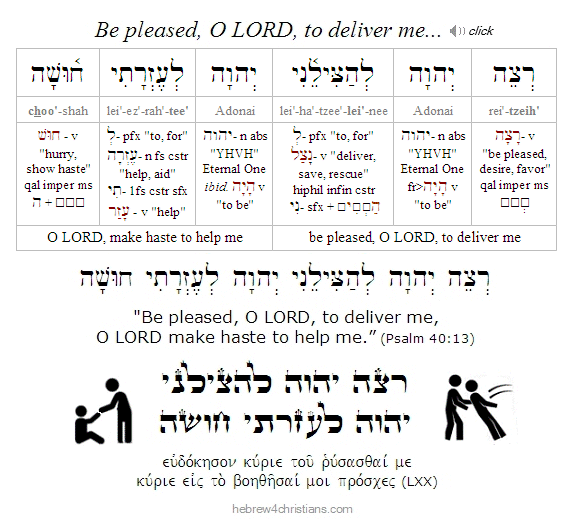 |
Parables and Revelation...
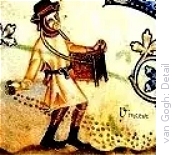
[ The holiday of Purim celebrates God's providential deliverance of his people... ]
03.05.23 (Adar 12, 5783) Yeshua often used various agricultural images in his parables. For example, he explained that people are known by the "fruits" of their lives (Matt. 7:16-20). He likened the spread of his message in terms of "sowing and reaping" (Matt. 13:3-23) and compared the Kingdom of Heaven to the secret working of a mustard seed (Matt. 13:31-32). Yeshua regarded the world as a "field" for planting with different "types of soil" (Matt. 13:38-43), and warned of the "great harvest" of souls at the end of the age (Luke 10:2; Matt. 13:30). He pointed to signs from a fig tree to indicate the nearness of the prophesied End of Days (Matt. 24:32-33). Yeshua also used the metaphor of a "vine and its branches" to explain how his followers are to be connected to Him (John 15:1-6).
Undoubtedly Yeshua taught in parables because they simultaneously conceal and reveal the truth. A parable obscures the truth to those who don't really want it; just as it reveals the truth to those who do (Luke 8:9-10; Psalm 72:8; Matt. 13:34-35). Since Yeshua's whole life was a parable of sorts - a "disguise" that led to the victory of our deliverance (Phil. 2:7) - it is not surprising that he regularly used "figures of speech" to provoke people to examine their own heart attitude and faith... In this connection note that Yeshua never explained the "mysteries of the kingdom of God" directly to the crowds, nor did He ever pander to the crowd's clamor or interests. His message is always meant for the individual soul who was willing to follow Him -- to the one who had "ears to hear."
Reading the parables can help us take inventory of our lives. For example, whenever we hear the famous "parable of the sower" (Matt. 13:3-23) we are reminded that God is like a farmer who sows seed upon the soil of human hearts (the quality of which may be hard, shallow, choked, or good). If we are honest with ourselves, we will see our own hardness, shallowness, and selfishness in contrast to the fruitfulness marked by the good soil, and this may prompt us to seek God for help. Only the new heart (lev chadash) created by power of God's Spirit can possibly yield the fruit of the Spirit. Yeshua therefore warns us: "Take care then how you hear, for to the one who has, more will be given, and from the one who has not, even what he thinks that he has will be taken away" (Luke 8:18).
Hebrew Lesson
Psalm 78:2 Hebrew with comments (click):
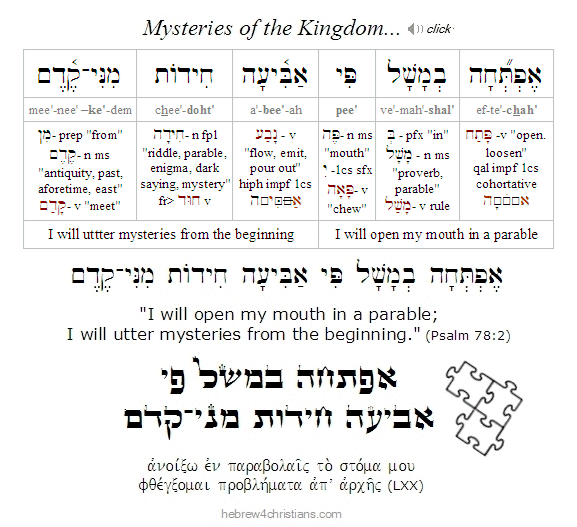 |
With God all things are possible, and the life of God is a miracle that comes from God's own source of Life. It is the fruit of the Spirit, after all, and not the fruit of human effort or moral reformation... Amen and Chag Purim Sameach!
Sabbath of the "Red Cow"
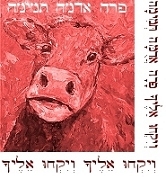
[ This coming Shabbat is called "Shabbat Parah," the Sabbath of the [red] Cow." Besides reading the regular Torah reading (i.e., Ki Tisa), we read about the mysterious red heifer sacrifice.... ]
03.05.23 (Adar 12, 5783) The Sabbath that immediately follows Purim is called Shabbat Parah - the "Sabbath of the [red] Cow." In traditional synagogue services, two Torah scrolls will be removed from the ark, and from the first scroll will be read the Torah portion for the week (e.g., Ki Tisa), and from the second will be read the chapter regarding the laws of the sacrifice of the "Red Heifer" (Num. 19:1-22). The early sages decided to recite the laws of the Red Heifer at this time to recall the remedy of the sin of the Golden Calf, and to remind the people to purify themselves before coming to Jerusalem for the pilgrimage festival of Passover. It is thought that since the sprinkling of the "waters of separation" cleanses from the uncleanness of death, reading this portion will help prepare our hearts for the time of Passover when we celebrate deliverance from death.
The Red Heifer offering is considered a paradox to most Jewish thinkers, though it can be seen as a revelation of the Yeshua our Messiah. The paradox is that the one who offers this sacrifice becomes ritually impure, while the sprinkling of the ashes is used to make people clean... The ritual is considered chok within the Jewish tradition, meaning that it makes no rational sense. The Talmud states that of all the 613 commandments given in the Torah, even King Solomon with all his wisdom could not fathom this decee. However, the sacrifice of Yeshua the Messiah can be understood as the fulfillment of the symbolism of the parah adumah. Both were entirely rare and without defect (sin); both were sacrificed "outside the camp"; both made the one who offered the sacrifice unclean but made the one who was sprinkled by it clean; and finally, both sacrifices cleanse people for priestly service.
The parah adumah had to be a perfect specimen that was completely red, "without blemish, in which there is no defect (mum)." The rabbis interpreted "without blemish" as referring to the color, that is, without having so much as a single white or black hair. This is the only sacrifice in the Torah where the color of the animal is explicitly required. Moreover, the parah adumah was never to have had a yoke upon it, meaning that it must never have been used for any profane purposes.
Unlike all other sacrifices offered at the altar, the parah adumah was taken outside the camp and there slaughtered before the priest, who then took some of its blood and sprinkled it seven times before the Mishkan (thereby designating it as a purification offering). [During the Second Temple period, the High Priest performed this ceremony facing the Temple while atop the Mount of Olives.] Then the red heifer would be burned in its entirety: its hide, flesh, blood, and even dung were to be burned (unlike other Levitical korbanot). Unlike other offerings, all the blood of the sacrifice was to be burned in the fire.
Hyssop, scarlet yarn, and a cedar stick would then be thrown upon the burning parah adumah (these same items were used to cleanse from tzara'at, skin disease). In other words, the blood was assimilated into the ashes of the sacrifice, which were then gathered and mixed with water to create the "water of separation" (mei niddah) for the Israelite community. Note that the word "separation" (niddah) refers to menstrual impurity and harkens to Zech. 13:1: "On that day there shall be a fountain opened for the house of David and the inhabitants of Jerusalem, to cleanse them from sin and from niddah."
Anyone (or anything) that came into contact with a corpse (the embodiment of sin and death) was required to be purified using the mei niddah. The purification procedure took seven days, using stalks of hyssop dipped into the water and shaken over the ritually defiled person on the third day and then again on the seventh day. After the second sprinkling, the person undergoing the purification process would be immersed in a mikvah and then be unclean until the following evening.
According to Jewish tradition, the Red Heifer sacrifice was to atone for the sin of the Golden Calf, though the Torah itself does not make this association. The LORD Yeshua, our High Priest of the New Covenant, is the perfect fulfillment of the Parah Adumah, since he was completely without sin or defect (2 Cor 5:21; John 8:46); he was sacrificed outside the camp (Heb 13:13); he made himself sin for us (2 Cor 5:21); his sprinkling makes us clean (1 Pet 1:2; Heb 12:24; Rev 1:5); and the "water of separation" that his sacrifice created is the means by which we are made clean from the impurity of sin (Eph 5:25-6; Heb 10:22).
Hebrew Lesson
Num. 19:2a Hebrew (click):
Note: For more on the Red Heifer sacrifice, see the "Gospel of the Red Cow" article.
Parashat Ki Tisa:
Brokenness and Atonement...
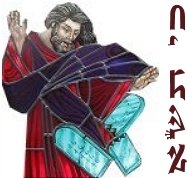
03.05.23 (Adar 12, 5783) Shavuah tov, chaverim. In our last two Torah readings (Terumah / Tetzaveh), Moses was upon Mount Sinai receiving the vision of the Sanctuary (i.e., the Mishkan or "Tabernacle") and its various furnishings. In this week's portion, Ki Tisa (כִּי תִשָּׂא), God commanded that all Israelite men over the age of twenty were required to pay a tax for the upkeep of the Sanctuary: "each shall give (וְנָתְנוּ) a ransom (i.e., kofer: כּפֶר) for his life to the LORD" (Exod. 30:12). After this tax was defined, the LORD described some additional elements that would be required for the priestly service at the Sanctuary, namely, a copper washstand, sacred anointing oil, and incense for the Golden Altar in the Holy Place. The Lord then named Betzalel, a man "filled with the Spirit of God" to be the chief architect of the Mishkan. Before the construction would begin, however, the Lord warned the people to be careful to observe the Sabbath day. Immediately following this admonition, God gave Moses the two tablets of the Ten Commandments, which were inscribed directly by the hand of God.
Before Moses returned to the camp, however, "certain people" had talked his brother Aaron into making a golden idol which they began to worship as their "god." The LORD then told Moses of their treachery and threatened to destroy all the Israelites, but Moses interceded on their behalf. As he rushed down the mountain, with the tablets in hand, he saw the people dancing about the idol and smashed the Tablets in anger. Moses then destroyed the idol and led the Levites in slaying 3,000 of the ringleaders.
The following day, Moses returned up the mountain and begged God to reaffirm the covenant. After a 40 day period of intercession, the Lord finally told Moses to carve a second set of Tablets and to meet him again at the summit of Sinai, where He would show Moses his glory and reveal to him the meaning of His Name (יהוה). When Moses encountered the LORD in a state of brokenness and forgiveness, his face began to shine with glory - a glory that foretold of the New Covenant of God's mercy and grace to come in Yeshua.
When the people saw Moses coming down the mountain with the second set of Tablets, they understood they were forgiven and that the Covenant had been renewed. When they approached him, however, they drew back in fear, because his face was radiant with the glory of God. Moses reassured them, however, and then told them all that the Lord had commanded while he was on the mountain. When Moses had finished speaking with them, he put a veil (מַסְוֶה) over his face. From that time on, Moses wore a veil in the camp, though he removed it whenever he went before the Lord for further instructions.
Why Purim Matters...
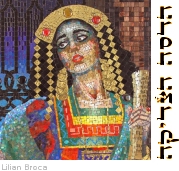
[ This is Shabbat Zachor, a time to remember God's faithful love for Israel... ]
03.04.23 (Adar 11, 5783) Shabbat shalom, and thank God for the Jewish roots of our faith, without which we would know nothing of the New Testament revelation or the ministry of Yeshua as the Messiah... As Yeshua said: ἡ σωτηρία ἐκ τῶν ᾽Ιουδαίων ἐστίν, "salvation is from the Jews" (John 4:22), and as he explained to his followers how all of the Jewish Scriptures testified of him as the Savior the world (Luke 24:27). And foreseeing the age to come, we read: "many people shall go and say, Come and let us go up to the mountain of the Lord, to the house of the God of Jacob; and he will teach us of his ways, and we will walk in his paths: for out of Zion shall go forth the law, and the word of the Lord from Jerusalem" (Isa. 2:3).
Historically, anti-Jewish statements have been made about the Book of Esther because Christian theologians and pastors have tended to disregard the importance of the Jewish roots of Christianity... After all, the central point of the book reveals God's providential care for ethnic Israel, and some Christian theologians have found this conclusion abhorrent to their theological biases.. Indeed, the Book of Esther leads inescapably to the celebration of Jewish identity and survival despite the evil plans and designs of anti-Semites, and therefore those theologians that believe that the church replaces Israel will tend to regard the message of the book with suspicion (or they will attempt to reinterpret "Israel" to mean the "church"). For those who understand that the church partakes of the covenantal blessings given to Israel, however, the Book of Esther is a beautiful story about God's faithful love and care for His people... There is a future and a hope for Israel that will indeed be fulfilled!
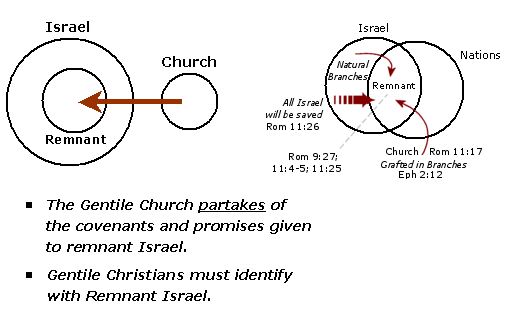 |
Hebrew Lesson:
Esther 9:28 reading (click for audio):
Some Related Topics:
The "Scandal" of Election...
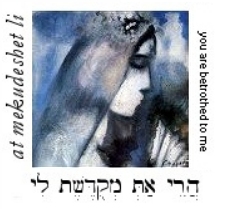
[ The holiday of Purim begins Monday, March 6th at sundown... Happy Purim chaverim! ]
03.03.23 (Adar 10, 5783) Shalom chaverim. The holiday of Purim serves a reminder for the church not to "boast over" the root of the Olive Tree of the Lord (Rom. 11:18). The Book of Esther centers on God's faithfulness and care of the Jewish people, and by extension, for all those (among the nations) who become partakers of Israel's blessings through Yeshua the Messiah. The "scandal" of the story turns on the "scandal of election," or the idea that God personally chooses some people -- for reasons that are entirely His alone -- to be the recipients of His covenantal love. The Jews are called the "chosen people" (עם הנבחר) just as Christians are said to be "chosen [εκλεγομαι] in Yeshua before the foundation of the world" (Eph. 1:4). In both cases we note God's sovereign prerogative to choose those who are in relationship with Him. Yeshua told his followers: "No one can come to me (δυναται ελθειν προς με) unless the Father who sent me drags [ἑλκύσῃ] him" (John 6:44, 6:65), and He also said "You did not choose me, but I chose you and appointed you" (John 15:16). God is the Initiator of the relationship; He is the Master of the Universe and "the God of the spirits of all flesh" (Num. 16:22). If there is revelation from heaven, it is Heaven's prerogative to bestow it on Heaven's own terms...
Hebrew Lesson:
Hosea 2:20 Hebrew reading:
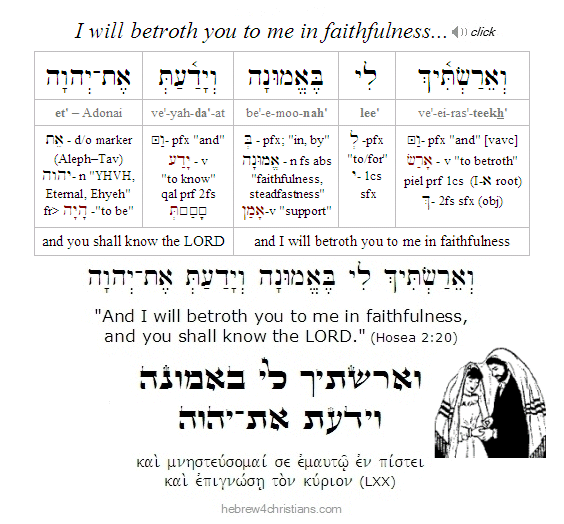 |
Regarding this divine prerogative, Paul reminded us of God's words to Moses: "I will be gracious to whom I will be gracious, and will show mercy on whom I will show mercy" (Rom. 9:15). He then followed this up with the statement: "So then it depends not on human will or exertion, but on God, who shows mercy" (Rom. 9:15-16). If this sounds "offensive" or "unfair," it may be that we are unconsciously appealing to our own supposed merit in order to find acceptance before God. The "scandal" of the gospel is that God loves whom He loves for reasons that are His alone, and this is likewise the scandal of God's sovereign choice of ethnic Israel. In either case, God is preeminent, and God is perfectly righteous in all he does.
Hebrew Lesson:
Exodus 33:19b Hebrew reading:
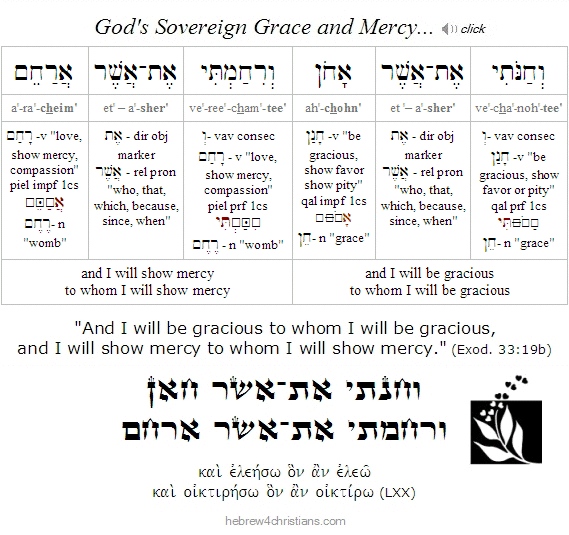 |
Addendum:
Freedom and God's Sovereignty...
Note that salvation is both for "whosoever wills" and is the direct result of God's effectual election for the particular individual... Though each person is responsible for believing the truth of God, no one is able to receive it apart from the intervening miracle of God's grace (see John 1:12-13; 3:3; 6:37,44; Jer. 31:3). Therefore we are instructed to "work out our own salvation with fear and trembling" because it is "God who works in you, both to will and to do his good pleasure" (Phil. 2:12-13). We are to "work out" what God "works in" to our heart of faith, though the beginning and end of salvation is the by means of the agency of God's power alone. I realize this is hard understand, but that does not mean we should dodge either side of the paradox, namely that it is our responsibility to "walk in faith" though we cannot do so apart from the intervention and sustaining power of God's Spirit our lives...
The life of faith is a "divine-human" cooperative whereby we learn to "walk in the Spirit" and understand our new identity forged by the grace of God. This is expressed by the apostle Peter where he wrote: "His divine power has granted to us all things that pertain to life and godliness, through the knowledge of him who called us to his own glory and excellence, by which he has granted to us his precious and very great promises, so that through them you may become partakers of the divine nature, having escaped from the corruption that is in the world because of sinful desire. For this very reason, make every effort to supplement your faith with virtue, and virtue with knowledge, and knowledge with self-control, and self-control with steadfastness, and steadfastness with godliness, and godliness with brotherly affection, and brotherly affection with love: For if these qualities are yours and are increasing, they keep you from being ineffective or unfruitful in the knowledge of our Yeshua the Messiah. Therefore, brothers, be all the more diligent to confirm your calling and election, for if you do these qualities you will never fall" (2 Pet. 1:3-10).
Note: For more on this topic see: "The Unchosen Chosen..."
 |
Hiddenness and Disclosure...

03.03.23 (Adar 10, 5783) The sages extol the importance of the holiday of Purim because it reveals the hidden hand of God, despite his apparent absence in the affairs of this world... On the surface, each turn of the story could be explained naturally, or as simple "coincidence," yet in the end we realize that God was at work behind the scenes, carefully putting together deliverance for God's people. The eye of faith trusts in God's providential plan, despite appearances to the contrary. Indeed, the phrase hester panim (הֶסְתֵר פָּנִים) means "hiding of the face" and is often used when discussing the Book of Esther. Understood as hidden providence, hester panim is somewhat like the sun on an overcast day: Just because you don't see it doesn't mean it isn't there. God's great love is at work at all times, in all affairs of the universe, whether we perceive it or not.
Hebrew Lesson:
Psalm 47:7 Hebrew reading:
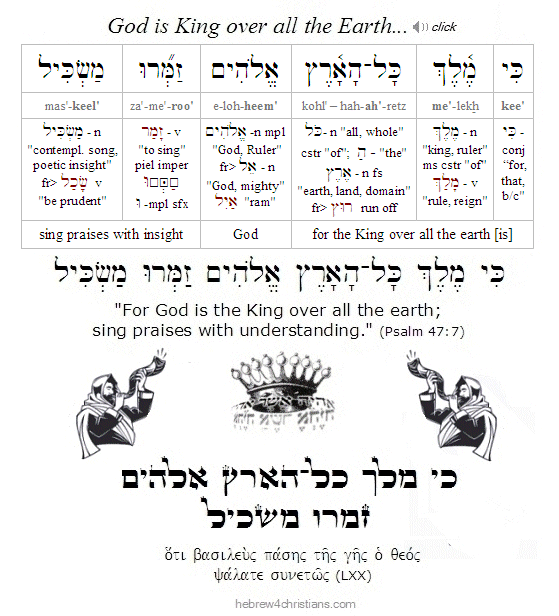 |
The holiday of Purim occurs this coming Monday, March 6th (at sundown) and runs through the following day. In anticipation of the coming holiday, then, let me wish you and your family Purim Sameach (פורים שמח) -- with the prayer that you will stand true to your faith, despite this wicked world and its syncretizing influences. Hooray for Mordecai! -- may the LORD raise up many like him! Shabbat Shalom.
Signs and Wonders...
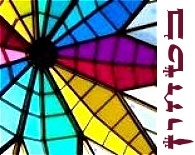
03.03.23 (Adar 10, 5783) Regarding those who seek the services of "miracle workers," the Kotzker Rebbe is reported to have said, "There are miracles and then there are miracles... Some people regard it as a miracle if God does someone's will; we regard as a miracle if someone does God's will." Amen, a true miracle, and one greater than the splitting of the sea, is that of a transformed heart that loves God and seeks to do God's will. Similarly, some people seek signs of the times and the End of the World, though the true "end of the world" arrives the moment you truly surrender your life to God's care...
Getting reading for Purim...
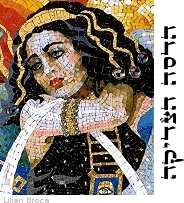
[ The holiday of Purim begins Monday, March 6th at sundown... Happy Purim Chaverim! ]
03.03.23 (Adar 10, 5783) The Scriptures state that the holiday of Purim "should be remembered and kept throughout every generation, every family, every province, and every city; and that these days of Purim should not fail from among the Jews, nor the memorial of them perish from their seed" (see Esther 9:28). According to Jewish tradition, we remember the miracles of Purim by means of four mitzvot (i.e., blessings): 1) honoring the appointed time as directed by the Scriptures (Esther 9:26-28); 2) performing acts of tzedakah and kindness (Esther 9:22; i.e., misloach manot: מִשְׁלוֹחַ מָנוֹת); 3) hearing the story of Esther read (i.e., Megillat Esther); and 4) enjoying a holiday Purim meal together.
The Midrash Esther says that Purim, unlike many of the other holidays, will be celebrated even after the final redemption after the End of Days. Maimonides says that the Book of Esther will enjoy the same status as the Torah of Moses in the world to come (Mishneh Torah, Megillah). This is because the story of Purim -- i.e., God's covenantal faithfulness and defense of His people -- will be magnified in the deliverance that leads to the establishment of the Messianic Kingdom upon the earth. Indeed, the Second Coming of the Messiah will be regarded as the final fulfillment of Purim (Rev. 19:11-16).
Purim is all about God's irrepressible, invincible, insuperable and sovereign love for His people. Though the wicked seem to sometimes have the upper hand in olam ha-zeh (this present hour), we need not fret or become anxious (Psalm 37:1, Prov. 24:19, Phil. 4:6). God is in control and His love and purposes overrule the counsel of the wicked. He will one day speak to the princes of this dark world in His wrath and terrify them in His fury (Psalm 2:5). God's great vision for Zion, the "City of the Great King," will never fail, friends, nor will His love for those who are trusting in Him. God's sovereign love is our great hope. As King David said, בָּרְכוּ־נָא אֶת־יהוה אֱלהֵיכֶם / Barekhu-na et-Adonai Elohekhem: "Now bless the LORD your God" (1 Chron. 29:20). פּוּרִים שָׂמֵחַ / Purim Sameach: "Happy Purim" chaverim!
Hebrew Lesson:
Psalm 97:1 reading (click):
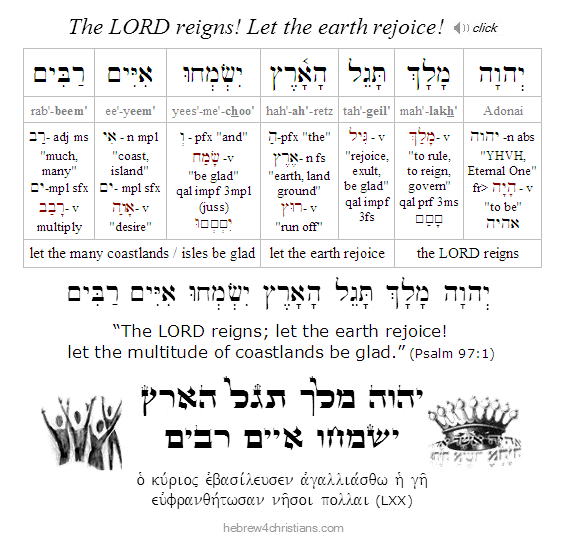 |
HAPPY PURIM CHAVERIM!
For more on this see the article: "Should Christians Celebrate Purim?"
The Time of Visitation...

03.03.23 (Adar 10, 5783) We must ready our hearts for the time of the Lord's coming, for the hour ever draws near... Yeshua lamented over Israel: "You did not recognize the time of your visitation..." (Luke 19:44). But how was it possible for otherwise devoutly religious people to miss the advent of the Messiah if it were not because they disregarded the signs meant to awaken them? "So also, when you see all these things, you know that he is near, at the very gates" (Matt. 24:33). That's part of the meaning of teshuvah as well: Repent and believe the message of life (see Heb. 3:7-4:11). Esau "repented" with tears, but his wasn't true repentance since he did not turn his heart to embrace the truth of God's love...
True repentance always leads to healing and life. When the woman from Magdala wept and washed Yeshua's feet with her tears, he said to those present, "I tell you, her sins, which are many, are forgiven -- for she loved much" (Luke 7:44-48). In other words, she was lavish in her love because she deeply regretted that she had missed what was most important, what she desperately needed all along... She realized her sin as blindness to God's love. After all, why would she weep over her sins unless she loved him? And how could she love him unless he first revealed his love to her? (1 John 4:19).
Friends, the Kingdom of God is at hand! Let us encourage ourselves to be ready for the glory soon to be revealed. Let us reaffirm what matters most and why we were given the blessing of life. The sound of the shofar heralds the coming hour when we will see our King Yeshua.
Hebrew Lesson:
Proverbs 1:23 Hebrew Reading:
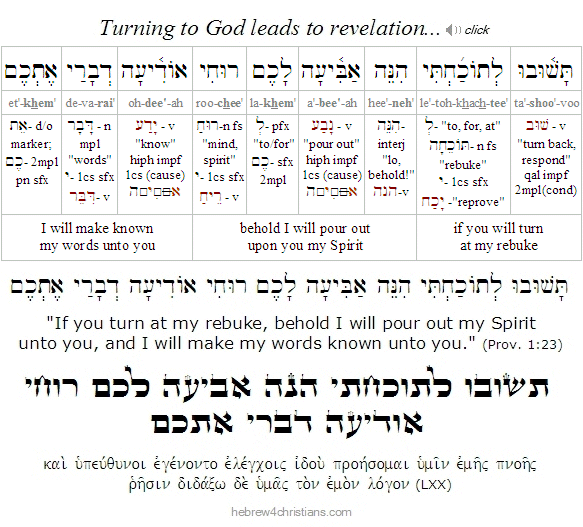 |
Finding Inner Peace...
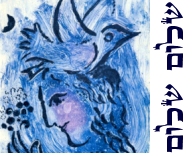
[ I don't need to understand as much as I need to trust. How my sins were taken away at the cross is a mystery, though I need to believe that God loves and heals me. What good is knowledge - even of things divine - without comfort? The struggle is to trust the heart of God - for everything - and especially for what breaks your heart... ]
03.03.23 (Adar 10, 5783) The ultimate question is whether you feel "safe" with the truth of who you really are... When you are all alone, in a moment of still silence, when the entire world is asleep and suspended, what is the message of your heart's cry? Are you okay? Do you trust who you are or what is happening to you, or do you experience anxiety, a sense of lostness, inner pain?
Comfort is found in God's grace. His promise is given to the sick at heart, to those who understand their need for a physician (Matt. 9:12). Since there is nothing about you to commend before God, you are made free to abandon yourself to the divine love. This is the "Name of the LORD," after all, and your heart's cry for love is a "prayer" uttered in that Name.
Your heavenly Father sees in secret (Matt. 6:6). Consider the birds of the air; they are unreflective, alive in the atmosphere of God's care. What a great blessing to let go of your fear; what sweet relief! Surrender to the truth of your helplessness; rejoice that you are "poor in spirit," and discover that yours is the Kingdom of Heaven (Matt. 5:3).
So don't give up your faith, my friend. The Lord will give strength to his people; the Lord will bless his people with peace. There is hope for your future. God has promised to be with you to the end, leading you to the place where your heart will forever be satisfied in his love.
Hebrew Lesson:
Psalm 29:11 Hebrew Reading:
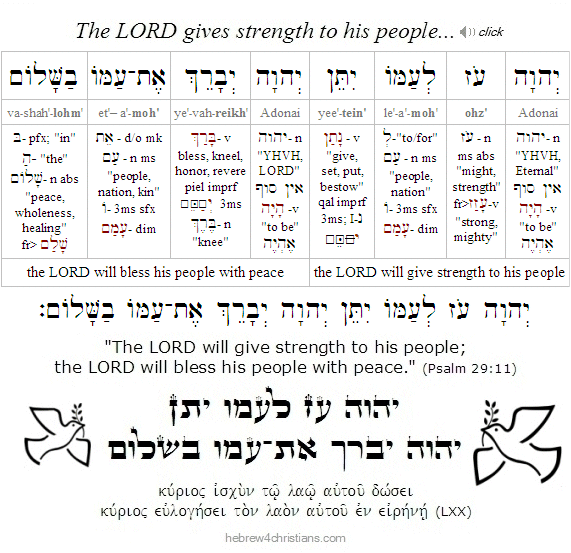 |
Shepherd in Darkness....

03.03.23 (Adar 10, 5783) "Yea, though I walk through the valley of the shadow of death, I will fear no evil..." (Psalm 23:4). O God of Light, Light of the world, surely You know my need for light as I look to You, especially when darkness tries to extinguish my hope. Despite my inability to see you now, help me to know that you are with me; let "thy rod and thy staff comfort me" and lead me closer to you. O Lord, when I am afraid, quicken the faith you have put within my heart. Be Thou my Shepherd in my darkness, O Lord my God...
In times of testing, how desperately do we need a sense of companionship and intimacy with the Lord! When you feel abandoned, ashamed, or alone; or when you are afraid and unsure of yourself; or when pain distances you from others, nudging you to isolation or loneliness, then may God's Spirit brood over you, whispering your name, reminding you that you are never alone, and that God Himself is forever for you, despite yourself. Therefore "fear no evil," because God is with you in the midst of your present darkness. As it is written: "Surely goodness and love shall pursue you all the days of your life, and you shall dwell in the house of the LORD forever" (Psalm 23:6). Come alive, O heart of faith!
Hebrew Lesson
Psalm 23:6 Hebrew reading:
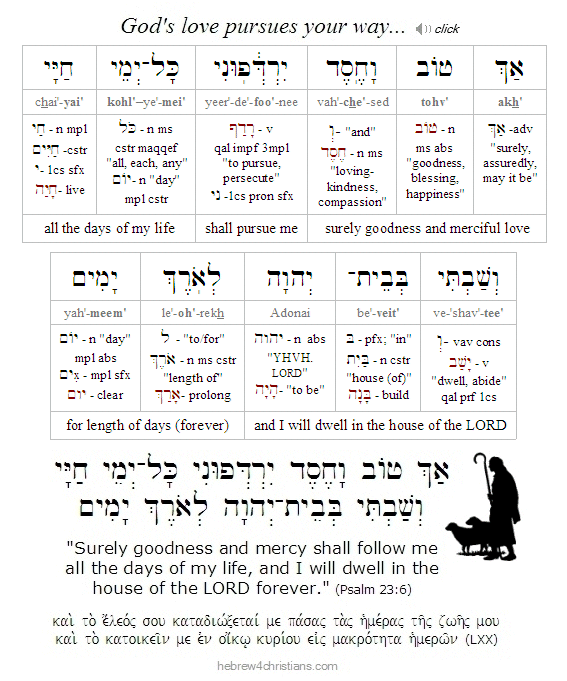 |
Groaning of Heart...
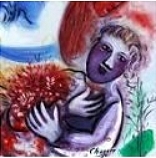
[ "The whole world groans and travails in pain..." (Rom. 8:22 ). ]
03.02.23 (Adar 9, 5783) God understands the ache of your heart: "O Lord, all my desire is before you; my groaning is not hidden from you" (Psalm 38:9). This is a hidden blessing, a severe mercy, a cry for God's Presence. Be encouraged: If you ask for bread, your Heavenly Father will not give you a stone. Until the Master of the Universe helps, the Master of the Universe will help... Amen. God will help us, and he will help us before we even know that he is helping us! Therefore do not be anxious, and do not fear, for "your heavenly Father knows what you need before you ask Him." God will make everything new, in the name and for the sake of his great love... Meanwhile relax, because nothing is in your control anyway...
אדני נגדך כל־תאותי
ואנחתי ממך לא־נסתרה
Adonai · neg·de·kha · khol - ta·a·vah·tee
ve·an·chah·tee · mee·me·kha · loh - nees·tah'·rah

"O Lord, all my desire is before you;
my groaning is not hidden from you."

Hebrew Lesson
Psalm 38:9 Hebrew reading (click):
We often know little of the things for which we pray. We cannot see the "big picture." Words often fail us, and in our darkness we are left with an inner groan or sigh of the heart. This is a blessing, for such prayer finally renders us silent under our Heavenly Father's care...
Memento mori... A test of earnestness regarding prayer is to so lift up your soul before the LORD as if these were the very last mortal words you would utter before your death... "Out of the depths I cry out to you, O LORD; O Lord, hear my voice" (Psalm 130:1-2).
Hebrew Lesson
Psalm 130:1-2a Hebrew reading (click):
Saved by Hope...

[ Hope is about the possible, despair is about the impossible, and therefore despair is the precondition for the miracle of salvation, because it confesses the impossibility of salvation apart from the miracle of love... ]
03.02.23 (Adar 9, 5783) The word of God teaches that we are saved by hope (Rom. 8:24). Such hope affirms that the divine healing of the Savior pervades all things and we can rejoice in the blessing of eternal life. Despair, on the other hand, sees no way out. Despair is a dark conviction of hopelessness that leads to sorrow, depression, and anger. It dwells on what apparently cannot be changed and therefore concludes that change is not possible. The way of despair teaches that you are ultimately victim. Hope, on the other hand, believes that change is genuinely possible - even in the worst of circumstances - and therefore it refuses to let despair have the last word. Hope wrestles through the darkness and refuses to let go until the blessing comes. It perseveres; it endures; and it overcomes: As the prophet Job testified in his grave darkness: "For I know that my Redeemer lives, and at the latter day he will stand upon the earth. And even after my skin has been destroyed, yet in my flesh I will see God - whom I shall see for myself, and my eyes shall behold, and not another. My heart faints within me!" (Job 19:25-27).
Friend, if you are in despair, turn open your heart to hope. Believe the "impossible." Quiet your heart and listen for the invitation: "Come unto me, you who suffer, and I will give you rest." Faith gropes in the darkness, reaches out in hope, and finds courage in the conviction that the lonely wound of your heart, the thought that you are unwanted, unimportant, and unacceptable, is not the truth about who you really are, but on the contrary, you are terribly loved, forgiven, and welcomed before God, and that there is place prepared for you, an eternal place of home, life, and blessing. Do not let despair consume your heart in grief. "All shall be well, and all manner of thing shall be made well." Can you believe it? Are you willing to open your heart to the possibility of God's love that will make you whole?
Hebrew Lesson
Job 19:25-26 Hebrew reading:
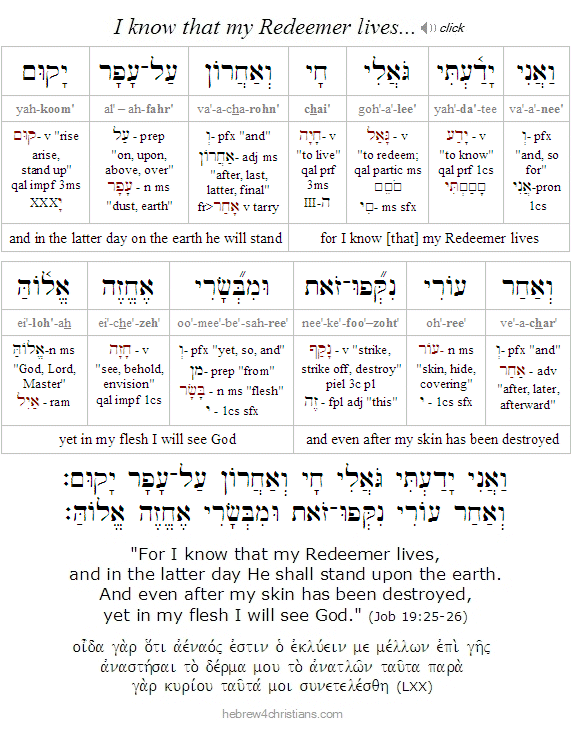 |
Light that overcomes darkness...
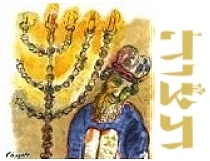
03.01.23 (Adar 8, 5783) This week's Torah reading (i.e., parashat Tetzaveh) begins with instructions for kindling the holy lampstand: "command the people of Israel to bring to you pure beaten olive oil for illumination (לַמָּאוֹר) to offer up (olah) an eternal or continual lamp (i.e., ner tamid: נֵר תָּמִיד)." Note that the word translated "lampstand" is menorah (מְנוֹרָה), which comes from the word for lamp, ner (נֵר). What is interesting about this verse is that the commandment to "offer up a continual lamp" occurs before the Tabernacle -- and the menorah itself - was even made. God's Light must shine first -- even before we can direct our worship to Him.... The Light of His Presence precedes even the "tent of meeting" itself.
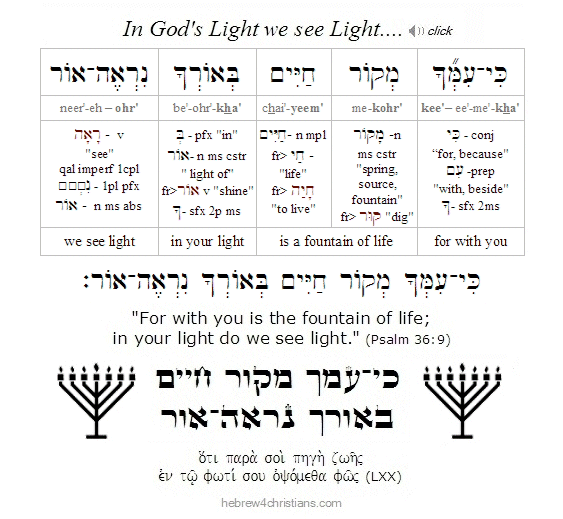 |
There is a Purim connection here. Perhaps you are familiar with the "Urim and Thummim," the "lights and perfections" that the High Priest sometimes used to discern messages from the LORD? Some scholars believe these were like lots (purim) that were used to get "yes/no" responses from the LORD (e.g., 1 Sam. 14:41, 28:6, Ezr. 2:63; Neh. 7:65). When Haman the Agagite kept "rolling the dice" until he found the "propitious" time to seek the destruction of the Jews (Esther 3:7), God was indeed watching. After Haman "divined" the twelfth month (Adar), he appealed to the King to put his hateful plan into action... He slandered the Jews and sought to incite the King's anger against them as traitors who pledged allegiance to a different King... All this was foreseen by the LORD and under His sovereign control. Little did Haman know that the dice he cast was for the appointed day of his own death... And so it goes for all those who "cast the lot" without understanding the overarching sovereignty of God...
On the Shabbat before Purim we are commanded to remember (zachor) Amalek: לא תִּשְׁכָּח / lo tiskach: "Do not forget!" (Deut. 25:19). Since Haman (and other enemies of God) are regarded as Amalekites, we remember that we are in a spiritual war, and the stakes are the highest known by mortal man. On Purim itself we recite the blessing She'asah nissim - "who has wrought miracles for our forefathers, in those days at this season" (just as we do at Chanukah). God is Light, but those who hate others live in darkness -- a deadly kind of darkness. Purim celebrates the deliverance of the LORD for His people and those who trust in Him are surrounded by His Light.
Just before Purim it is considered a mitzvah (or blessing) to send gifts of food to friends (called mishloach manot) and to give tzedekah (charity) to the poor (called matanot la'evyonim). These customs come from the story of Esther itself (Esther 9:22). Sharing with others is a means of spreading the Light of God in this dark and perverse world (1 John 3:17). We then can enjoy our seudah (festive meal) with greater joy.
These are perilous times, chaverim. The battle we face is with fear: fear of man, fear of this world, fear of disaster, etc. The story of Purim reassures us that "all things work together for good to those who love God" (Rom. 8:28). May "God grant us the serenity to accept the things we cannot change; the courage to change the things we can; and the wisdom to know the difference."
Lord God of Israel, we are looking to you at this hour... Help us to remember the truth that You are in complete control of this world and the "outcome of the dice..." It is difficult to find peace in the midst of this world and its storms, but we are looking to You for help.... We are living in the End of Days: the world is reeling in fear and dread, and yet we are called to shine the light of your love and presence at all times. Please help us to walk in the strength and assurance of Your holy Light -- the Light that suffuses all things. Let the Light of Your countenance shine upon us; pour out your shalom upon us. Help us trust that You will work all things together for good, for the sake of the glory of Your Precious Name. We love you and thank you, LORD - help us to walk in your love. B'shem Yeshua Adoneinu - Amen.
Intercession and Incense...
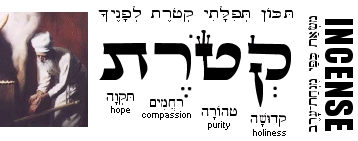
[ The following is related to this week's Torah reading, parashat Tetzaveh... ]
03.01.23 (Adar 8, 5783) The last item described in the Mishkan (i.e., the "Tabernacle") was a golden "altar of incense" (הַמִזְבַּחַ הַזָּהָב) that was to be placed in the Holy Place just before the veil separating the Holy of Holies (parochet). Every morning and evening the High Priest would burn sacred incense on this altar (symbolizing prayer and intercession), and the blood of atonement was also applied there during the Yom Kippur service (Exod. 30:6-10).
The sages say that the word "incense" – i.e., ketoret (קְטרֶת) – can be thought of as an acronym of the words kedushah (קְדוּשָׁה), "holiness," tahorah (טָהֳרָה), "purity," rachamim (רַחֲמִים), "compassion," and tikvah (תִקוָה), "hope," characteristics that marked the passion of Yeshua who interceded for us as he offered his blood before the heavenly kapporet as our High Priest of the new covenant. Indeed, the word ketoret comes from a root word (קטר) that means to offer sacrifice, further alluding to the intercession of Messiah on our behalf (Heb. 7:25). Disciples of Yeshua are likewise called priests of God (Rev. 1:6; 1 Pet. 2:5), and our prayers and service are regarded as a "sweet-smelling savor" offered to the Lord (Rev. 8:4). As it says in the Psalms: "Let my prayer be counted as incense before You; the lifting up of my hands as the evening sacrifice" (Psalm 141:2).
Hebrew Lesson:
Psalm 141:2 Hebrew reading:
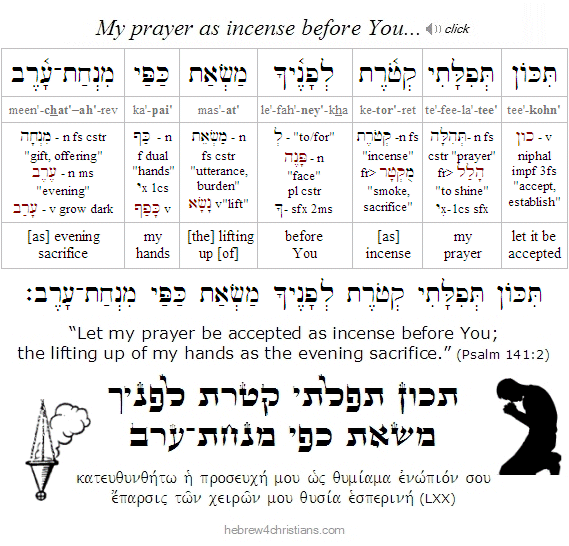 |
Note: The Talmud states that the sacred incense recipe was made of eleven different spices, ten of which had pleasant fragrance, but one of which (i.e., galbanum) had an unpleasant odor. The sages explain that that the word for "community" in Hebrew (i.e., tzibbur: צִבּוּר) may be understood as an acronym for tzaddikim (צַדִּיקִים), "the righteous," be'nayim (בֵּינַיִם), "the intermediate," and resha'im (רְשָׁעִים), "the wicked," and that the presence of galbanum makes place for the transgressors... The presence of an unpleasant odor in the sacred mixture represents our laments, our cries, and confession for the foulness of our sins.
Crushed for the Light...

[ The following is related to this week's Torah reading, parashat Tetzaveh... ]
03.01.23 (Adar 8, 5783) From our Torah portion for this week (i.e., Tetzaveh) we read: "You shall command the people of Israel that they bring to you pure olive oil "crushed for the light" (כָּתִית לַמָּאוֹר), that an eternal lamp (נר תמיד) may be set up to burn" (Exod. 27:20).
The Hebrew word for "pure" olive oil is zakh (זך), which refers to the clearest oil derived from squeezing out (or crushing) the very first drop from the choicest olive. The purest of oil was obtained by a process of "crushing for the light" (כתית למאור), which symbolizes the Light of the World, the One Crushed for our iniquities, the "Man of Sorrows" (אישׁ מכאבות) who offered himself up for our healing and illumination (Isa. 53:1-5).
Some things are seen only through the process of tribulation, breaking, and surrender. When we kindle this lamp, we are able to see the truth; we perceive how God's heart was crushed for the sake of our salvation...
Hebrew Lesson:
Isaiah 53:5 Hebrew reading:
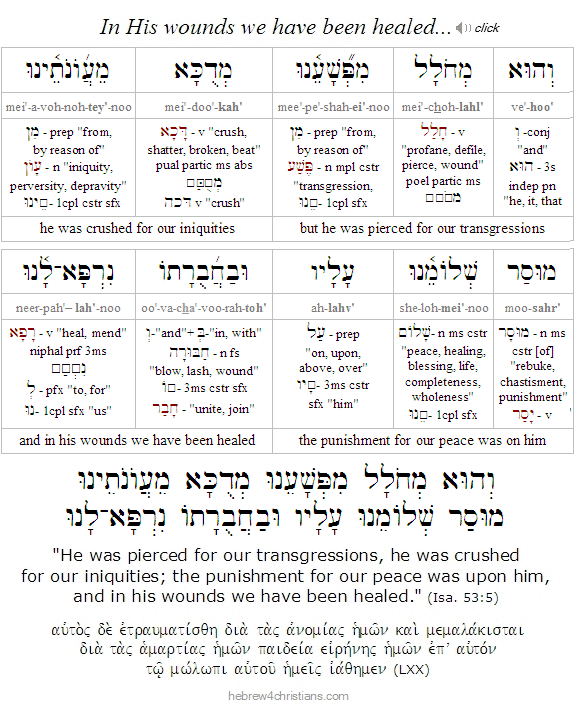 |
<< Return
|

















